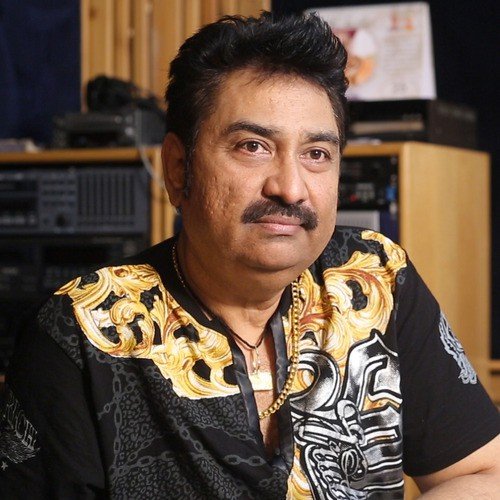
Kumar Sanu
Artist · 8,935,857 Listeners
Some content courtesy of Wikipedia.
Born
October 20, 1957
Introduction
Winner of five consecutive Filmfare awards and having his name entered in the Guinness Book of World Records for recording 28 songs in one day, Kumar Sanu has gained global fame. Mostly singing melodious love songs, Kumar Sanu captured the hearts of many through his tracks in the romantic movie Aashiqui.
Early life
Kumar Sanu's father, Pashupati Bhattacharya, was a vocalist and composer. He trained Sanu as a singer and tabla player. After getting a degree in commerce from Calcutta University, Sanu began performing in 1979, singing at shows and restaurants around Calcutta. He tried to model his singing style after Bollywood singer Kishore Kumar.
Career
Initial Years
Kumar Sanu was born as Kedarnath Bhattacharya in Kolkata. His vocalist-composer father, Pasupati Bhattacharya trained Kumar Sanu in singing and playing tabla. After getting a degree in commerce from Calcutta University, Sanu started singing at shows and restaurants in Calcutta. Sanu emulated his singing style on the lines of Kishore Kumar initially, and his career in playback singing began with a Bangladeshi film called Tin (Teen) Kanya in 1986. Music Director Jagjit Singh then gave Sanu an opportunity to sing in the Hindi film Aandhiyan in 1987, after which Sonu shifted to Mumbai. Here, Kalyanji-Anandji got him a break, enabling him to sing in the film Jaadugar in 1989. His collaboration with Nadeem Shravan for the 1990 film Aashiqui catapulted him to glory, as he won the first of his five Filmfare awards.
The 1990’s
Throughout the 1990’s he collaborated with the Nadeem-Shravan duo for notable film tracks from Dil Hai Ke Manta Nahin (1991), Sadak (1991), Saajan (1991), Deewana (1992), Dil Ka Kya Kasoor (1992), Kal Ki Awaz (1992), Salami (1994), Damini – Lightning (1993), Shreemaan Aashique (1993) and Dilwale (1994).
By mid-1990’s, he went to sing for films like Agni Sakshi (1996), Raja Hindustani (1996), Jeet (1996), Pardes (1997) and Sirf Tum (1999). His collaboration with the duo continued in the early millennium with films like Kasoor (2001), Dil Hai Tumhaara (2002), Dil Ka Rishta (2003), Indian Babu (2003) and Andaaz (2003), among others. In the same period, he also worked with the duo Jatin- Lalit, singing in films like Khiladi (1992), Raju Ban Gaya Gentleman (1992) and Kabhi Haan Kabhi Naa (1993). By the middle of the decade he sang in Dilwale Dulhania Le Jayenge (1995), Khamoshi (1996), Yes Boss (1997), Jab Pyaar Kisise Hota Hai (1998), Kuch Kuch Hota Hai (1998), Pyaar To Hona Hi Tha (1998), Ghulam (1998), Dil Kya Kare (1999) and Sarfarosh (1999).
Anu Malik initiated Sanu’s first ‘Western type’ of songs, with songs like Yeh Kaale Kaale Aankhe for the 1993 film Baazigar. Sanu’s other film songs with Anu Malik include Phir Teri Kahani Yaad Aayee (1993), Sir (1993), Imtihaan (1994), Vijaypath (1994), Main Khiladi Tu Anari (1994), Naaraaz (1994), Naajayaz (1995), Diljale (1996), Virasat (1997), Judwaa (1997), Tamanna (1997), Duplicate (1998), Ishq Vishq (2003), Fida (2004) and No Entry (2005).
Among other music directors he has worked with are Bappi Lahiri, RD Burman, Anand- Milind, Rajesh Roshan, Nusrat Fateh Ali Khan, A R Rahman, Laxmikant–Pyarelal, Viju Shah, Vishal–Shekhar, Ismail Darbar and more.
Trivia
Kumar has sung over 18,000 songs in 22 languages and has his name entered in the Guinness Book of World Records in 1993 for recording 28 songs in one day. Have a look at some of his views on music and life.
Sanu Speaks
On differences between the films Aashiqui 1 and 2: He says the hero of the first film was its music and there would not be a film like it for the next 50 years. On Aashiqui 2, he says “they’ve ignored the music†and he personally felt that not all the songs were great, and storyline was not up to mark, making just an ‘ok’ movie.
On Hit Films : He says that for a film to be a hit, the story and the music are of utmost importance, stressing that Ajay Devgn became popular because of hit numbers in Phool Aur Kaante, Rahul Roy became a hit with songs from Aashiqui and Prithivi from the songs of Dil Ka Kya Kasoor. Further, Shah Rukh Khan gained prominence due to numbers from the film Raju Ban Gaya Gentlemen while Sanjay Dutt’s popularity doubled due the musicals Sadak and Saajan. “Those days music was sold. Today singers pay to sing,†he quips.
On Celebrities and Social Responsibility: Kumar Sanu agrees that today’s celebrities are shunning their social responsibility towards society. Vulgar lyrics as in Fevicol, Shiela Ki Jawani, Chikni Chameli and Jalebi bai are teaching wrong things to the youth and that to some extent, Bollywood was responsible for the increase in crime in India.
On Malayalam Melodies: He says he loves the fact that the Malayalam film industry gives equal importance to melodious songs, and that he would love to sing more Malayalam movie songs.
On the Miraculous Powers of Music: Commenting on the miraculous powers of the song Jab Koi Baat Bigad Jaaye from the 1990 film Jurm, he says, “The song has helped cure cancer patients in Hong Kong. It seems to have a shakti.†He says the song has a positive vibe which gives people a “…Haunsla – a boost which heals†and tells them that life is not meant to frittered away.